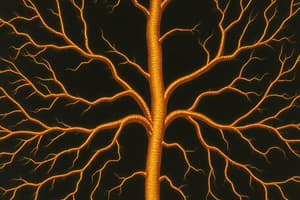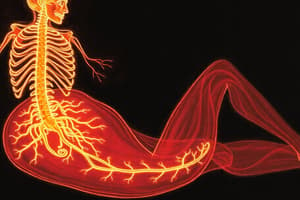Podcast
Questions and Answers
Match the medication with its primary use:
Match the medication with its primary use:
Diuretics = Promote diuresis and reduce fluid retention Vasodilators = Dilate blood vessels to lower blood pressure Antidepressants = Used to treat depression and anxiety disorders Insulin = Regulates blood sugar levels
Match the disorder with its impact on the Autonomic nervous system:
Match the disorder with its impact on the Autonomic nervous system:
Diabetes mellitus = Disrupts Autonomic nervous system function Parkinson’s disease = Commonly associated with low blood pressure Hypertension = Causes overactivity of the sympathetic nervous system Atherosclerosis = Affects blood flow and vessel dilation
Match the mechanism with its effect on blood pressure upon standing:
Match the mechanism with its effect on blood pressure upon standing:
Reduced venous return = Leads to decreased blood return to the heart Reflex mediated syncope = Causes fainting due to abnormal reflex response Cardiac mediated syncope = Results from underlying heart-related issues Valvular disease = Involves damage to heart valves affecting blood flow
Match the type of syncope with its common cause:
Match the type of syncope with its common cause:
Match the symptom with the corresponding heart-related issue:
Match the symptom with the corresponding heart-related issue:
Dysautonomia refers to disorders that disrupt the Autonomic nervous system, common in patients with Parkinson’s disease due to low blood pressure. Mechanism: Reduced venous return upon __________
Dysautonomia refers to disorders that disrupt the Autonomic nervous system, common in patients with Parkinson’s disease due to low blood pressure. Mechanism: Reduced venous return upon __________
Reflex mediated syncope occurs as a result of an abnormal reflex response in the body. Common reasons include Vasovagal and _________
Reflex mediated syncope occurs as a result of an abnormal reflex response in the body. Common reasons include Vasovagal and _________
Vasovagal syncope is caused by overactivity of the vagus nerve, especially in response to stress like fear or emotional distress. It is most commonly referred to as ________
Vasovagal syncope is caused by overactivity of the vagus nerve, especially in response to stress like fear or emotional distress. It is most commonly referred to as ________
Carotid sinus syncope is triggered by compression on the carotid sinus, leading to activation of the Parasympathetic nervous system. Common triggers include tight-fitting shirt and ________
Carotid sinus syncope is triggered by compression on the carotid sinus, leading to activation of the Parasympathetic nervous system. Common triggers include tight-fitting shirt and ________
Cardiac mediated syncope occurs due to an underlying heart-related problem. Common reasons include Arrhythmia and ________ disease
Cardiac mediated syncope occurs due to an underlying heart-related problem. Common reasons include Arrhythmia and ________ disease
A fall in blood pressure caused by the overactivity of the vagus nerve, especially in response to stress, is known as ________ syncope
A fall in blood pressure caused by the overactivity of the vagus nerve, especially in response to stress, is known as ________ syncope
Fainting while urinating is also known as ________ syncope
Fainting while urinating is also known as ________ syncope
The compression on the carotid sinus causes the Sympathetic nervous system/brain to feel high blood pressure, leading to activation of the ________ nervous system
The compression on the carotid sinus causes the Sympathetic nervous system/brain to feel high blood pressure, leading to activation of the ________ nervous system
Reflex mediated syncope can be triggered by coughing, sneezing, or GI stimulation, known as ________ syncope
Reflex mediated syncope can be triggered by coughing, sneezing, or GI stimulation, known as ________ syncope
Damaged heart valve can be a reason for Cardiac mediated syncope, known as ________ disease
Damaged heart valve can be a reason for Cardiac mediated syncope, known as ________ disease



